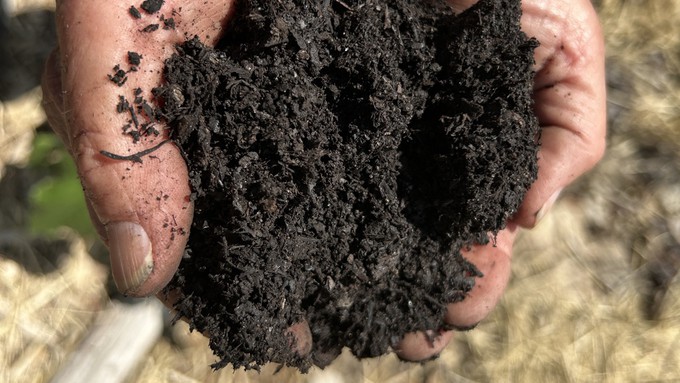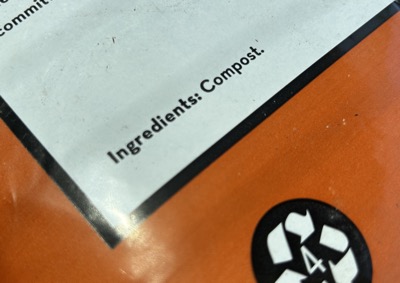
Free compost available to residents in pilot recycling program

Here's why it's called "black gold" -- it doesn't get much richer than this compost from Sacramento County's Waste Management and Recycling program. (H/t Laura Cerles-Rogers) Kathy Morrison
Since July 1. Sacramento County residents have been throwing all kinds of things into their organic waste (formerly green waste) bins: Chicken bones, greasy pizza boxes, used wine corks, snubbed cat food, moldy cheese, salmon skin and many other organic items, not just leaves and grass clippings.
A bizarre combination, to be sure, but the County Waste Management and Recycling program assured us that it would all be acceptable and put to good use.
Over the subsequent months we may have forgotten what the end result might be. But the county's been working hard and, nearly 11 months later, "it's soup." Specifically, all those bits and bones have been cooked into the black gold known as compost.
And it's free for the taking. Monday through Friday, between 10 a.m. to 2 p.m., the county will make compost deliveries to its property at 3843 Branch Center Road (near Bradshaw and Kiefer roads), based on demand.
There are some details. First, you have to shovel the compost yourself, with your own tools, into your own containers. No mechanical loading is allowed. It's available on a first-come, first-served basis, but can be loaded up anytime, 24/7.
The county says it plans to have compost available on demand from spring until early fall. The compost pile will be restocked as necessary.
This process started in California with Senate Bill 1383, which requires that organic materials be kept out of landfills. Each county or city had to come up with its own organic waste recycling program. We previewed the Sacramento program's start in this post last summer. Many people now have the little buckets under their sinks and empty them into the organic waste bins each week.

So what to do with this free compost? (Or any compost, for that matter.) Well, it's a spectacular soil amendment, and also an excellent mulch. What compost is not is plant fertilizer -- though plants certainly benefit from it. Because compost can be made of so many different things, and can be different in each batch, it has no guaranteed list of plant nutrients. That goes for commercial compost as well as the county's -- see photo at right of a bag of commercial organic compost.
So if your roses need a dose of nitrogen or melons require some phosphorus, don't rely on just compost. But the soil they grow in will love it.
Find out more on Sacramento County's compost program here: https://wmr.saccounty.gov/Pages/Self-Serve-Compost.aspx
---
Some of our previous posts on compost and composting:
Comments
0 comments have been posted.Sacramento Digs Gardening to your inbox.
Sites We Like
Garden Checklist for week of May 12
Get your gardening chores and irrigation done early in the day before temperatures rise.
* Plant, plant, plant! It’s prime planting season in the Sacramento area. Time to set out those tomato transplants along with peppers and eggplants. Pinch off any flowers on new transplants to make them concentrate on establishing roots instead of setting premature fruit.
* Direct-seed melons, cucumbers, summer squash, corn, radishes, pumpkins and annual herbs such as basil.
* Harvest cabbage, lettuce, peas and green onions. This heat will cause leafy greens and onions to flower; pick them before they bolt.
* In the flower garden, direct-seed sunflowers, cosmos, salvia, zinnias, marigolds, celosia and asters.
* Plant dahlia tubers. Other perennials to set out include verbena, coreopsis, coneflower and astilbe.
* Transplant petunias, marigolds and perennial flowers such as astilbe, columbine, coneflowers, coreopsis, dahlias, rudbeckia and verbena.
* Keep an eye out for slugs, snails, earwigs and aphids that want to dine on tender new growth.
* Feed summer bloomers with a balanced fertilizer.
* For continued bloom, cut off spent flowers on roses as well as other flowering plants.
* Got fruit trees? If you haven't already done so, thin orchard fruit such as apples, peaches, pears, pluots and plums before they grow too heavy, breaking branches or even splitting the tree. Leave the largest fruit on the branch, culling the smaller ones, and allow for 5 to 6 inches (or a hand's worth) between each fruit.
* Thin grape bunches, again leaving about 6 inches between them. For the remaining bunches, prune off the "tail" end, about the bottom third of the bunch, so that the plant's energy is concentrated in the fruit closest to the branch.
* As spring-flowering shrubs finish blooming, give them a little pruning to shape them, removing old and dead wood. Lightly trim azaleas, fuchsias and marguerites for bushier plants.
* Add mulch to the garden to help keep that precious water from evaporating. Mulch also cuts down on weeds. But don’t let it mound around the stems or trunks of trees or shrubs. Leave about a 6-inch to 1-foot circle to avoid crown rot or other problems.